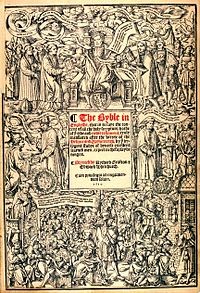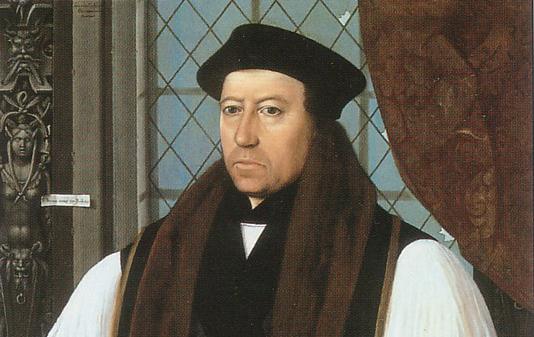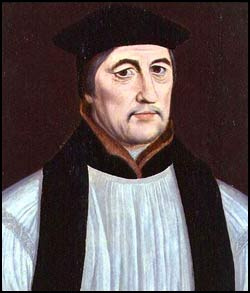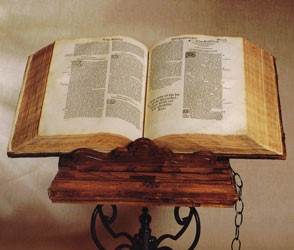Cromwell and the English Bible
Chapter 4 : The Great Bible
Miles Coverdale was a Cambridge graduate, who was ordained priest in 1514, before becoming an Augustinian Friar. Amongst his circle of acquaintances were Robert Barnes, later burnt for heresy, Sir Thomas More, and Cromwell.Coverdale’s views became more evangelical as time passed, and he spent the years 1528 – 1534 abroad. By 1535 he had completed a translation of the Bible, which was the first full translation, and much of which found its way into the King James’ Authorised Version of 1611. Two more editions of the 1537 work were published, and, although it was not an official translation, it appeared in many parish churches from 1st August 1537, from which date all churches were to have an English Bible.

The title page, designed by Holbein, shows Henry VIII brandishing the Sword of Justice in one hand, and giving the Word of God to his bishops with the other. The work is dedicated to Henry saying
‘He only under God is the Chief Head of all the congregation of the Church’.
Coverdale was now free to return to England, where he arranged a further printing of his New Testament, bound together with a copy of the Vulgate.
Another translation appeared in 1537, also licensed for use. This was the Matthew Bible, a combination of translations from Coverdale, Tyndale and Thomas Matthews, chaplain to the Merchant Adventurers in Antwerp. This Bible was Archbishop Cranmer’s personal favourite and was to be used until the Bishops should ‘set forth a better translation’ although he admitted to Cromwell that this would probably not be achieved until ‘the day after Domesday.’

In fact, Cranmer had already taken steps for a new translation and allocated sections to different bishops for translation. The fact that one of these was the conservative Gardiner, Bishop of Winchester confirms that a desire for an English Bible was not a hallmark of Lutheranism, especially as Gardiner, unlike many of the others, completed his section – the Gospels of Luke and John.
Nevertheless, it was agreed, presumably between the King, Cranmer and Cromwell, that the first authorised translation would be a revision of the Matthew Bible, supervised by Coverdale and with additions from Sebastian Munster’s rendition of the Old Testament from the original Hebrew.
On 5th September 1538 Cromwell, as the King’s Vicegerent in Spirituals, ordered that the Bible be available in all churches by All Saints’ day (1st November), although, in the event, the new translation was delayed.

There was a lack of facilities for printing such a large work, and the copies needed, in London, so Bishop Gardiner was asked to obtain a licence from Francois I for its production in France. The licence was granted, but the French Inquisitor-General smelt heresy and tried to have the book impounded. Fortunately, Coverdale and the printer, Richard Grafton, managed to escape France with the type, the printing press and the sheets completed to date. The work was finished and issued in London in April 1539.
The resulting tome was known as ‘The Great Bible’ not for its brilliance, but for its size – it was to be of a size to be read and consulted by every parishioner.

Cromwell’s desire to see the Bible in English, available to everyone, cannot be denied, yet he saw no harm in turning a profit from it too. He invested £800 in the printing, and obtained a monopoly of the profits of the first five years of print runs. The book was to be of the largest volume, printed on good quality paper, and to cost 10 shillings – Cranmer had thought 13s 4d reasonable. The parish priest and his flock were to share the purchase price between them.Whilst unlearned folk were not to dispute on the content of the Bible, everyone was to be encouraged to read ‘the very lively word of God that every Christian person is bound to embrace, believe and follow’.
This article is part of a Profile on Thomas Cromwell available for Kindle, for purchase from Amazon.


